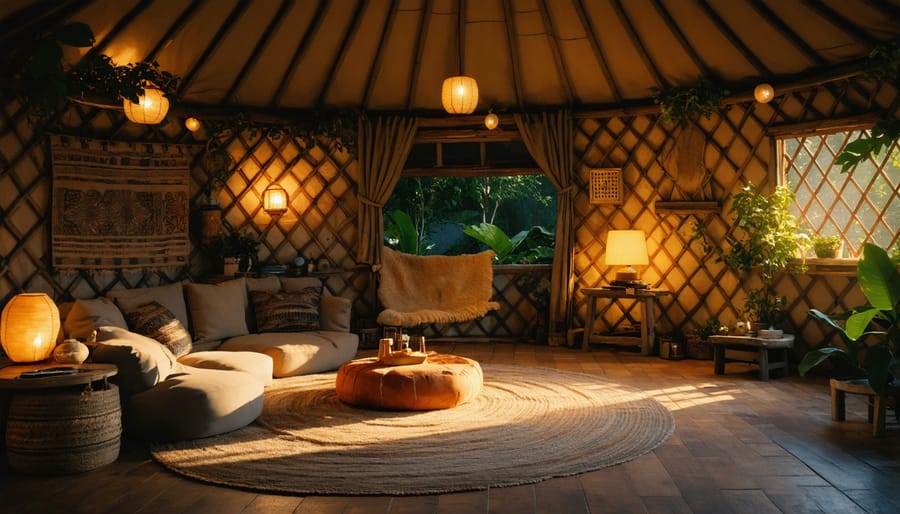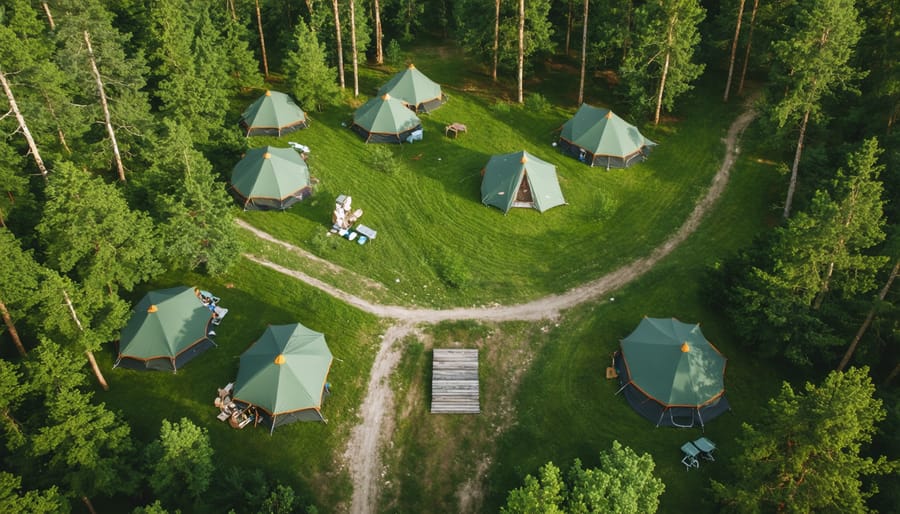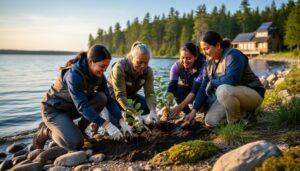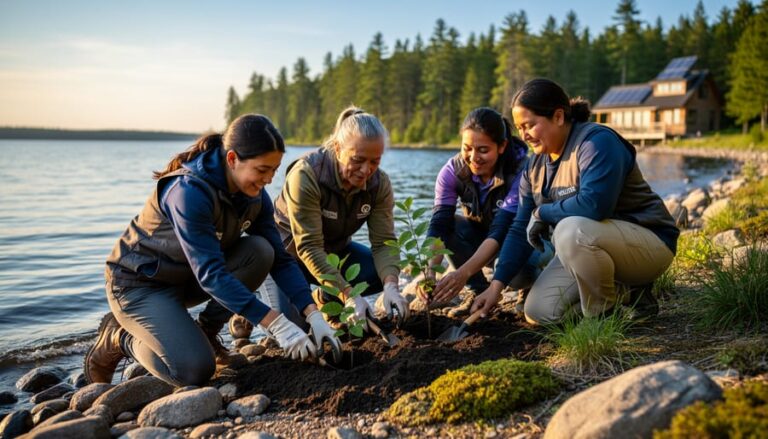Discover Ontario’s natural wonders from the comfort of sustainable eco-friendly accommodation options that range from rustic yurts to solar-powered cabins. Nestled among pristine lakes and ancient forests, Ontario’s diverse lodging experiences transform ordinary park visits into extraordinary adventures that connect you deeply with nature while minimizing environmental impact.
From the rugged wilderness of Algonquin Park’s backcountry campsites to the luxurious eco-lodges of Blue Mountain, each accommodation tells its own story of conservation and comfort. Whether you’re seeking a cozy winterized cabin in Killarney Provincial Park or a floating cottage on Lake Ontario, the province offers year-round stays that cater to every outdoor enthusiast’s needs.
Experience the magic of starlit nights from a glass-roofed dome, wake up to misty morning views in a treehouse suite, or gather around a crackling fire outside your wilderness cabin. These thoughtfully designed spaces not only provide shelter but create unforgettable memories while preserving Ontario’s natural heritage for future generations.
Cozy Yurts and Eco-Cabins
Year-Round Yurt Experience
Experience the perfect blend of comfort and wilderness with year-round yurt camping in Ontario’s stunning parks. These circular, canvas-wrapped structures offer a cozy retreat whether you’re seeking summer adventures or winter wonderland experiences.
Each yurt comes equipped with essential amenities to make your stay comfortable. Inside, you’ll find wooden floors, lockable doors, electrical outlets, and comfortable furniture including bunk beds and a table with chairs. The best part? A wood stove keeps you toasty during chilly nights, while screened windows provide refreshing cross-ventilation in warmer months.
Located in popular provincial parks like Killarney, Pinery, and MacGregor Point, these eco-friendly accommodations minimize environmental impact while maximizing your connection with nature. Solar-powered lighting and composting toilets nearby demonstrate Ontario Parks’ commitment to sustainability.
Pro tip: Book your yurt well in advance, especially for summer weekends and winter holidays. Pack as you would for camping, but enjoy the luxury of not having to set up a tent! Each yurt includes an outdoor fire pit perfect for evening cookouts and stargazing sessions. During winter, many locations offer easy access to cross-country skiing and snowshoeing trails right from your doorstep.
Remember to bring your own bedding, cooking equipment, and seasonal gear – these home-away-from-home havens provide the perfect base for year-round outdoor adventures while treading lightly on the environment.

Rustic Eco-Cabins
For eco-conscious travelers seeking a genuine connection with nature, Ontario’s rustic eco-cabins offer an unforgettable wilderness experience with minimal environmental impact. These thoughtfully designed accommodations harness the power of the sun through solar panels, providing basic electricity while maintaining a light footprint on the surrounding landscape.
Picture yourself waking up in a cozy wooden cabin, sunlight streaming through energy-efficient windows as you sip your morning coffee on a private deck overlooking pristine forest. These cabins typically feature LED lighting, composting toilets, and water-saving fixtures, allowing guests to live comfortably while conserving precious resources.
Many eco-cabins are strategically positioned to maximize natural heating and cooling, reducing the need for artificial climate control. During summer months, large screened windows welcome cool forest breezes, while in winter, south-facing windows capture valuable solar heat. Rainwater collection systems and greywater recycling further demonstrate how modern sustainability meets wilderness comfort.
What makes these accommodations truly special is their integration with the natural environment. Most are built using locally sourced materials and sustainable construction practices, creating a harmony between comfort and conservation. Guests often find themselves sharing their outdoor space with local wildlife, from curious chipmunks to melodious songbirds.
Insider tip: Book your eco-cabin well in advance for summer stays, as these popular accommodations fill up quickly with nature enthusiasts seeking a sustainable wilderness retreat.
Green Camping Solutions
Roofed Accommodation
Ontario’s roofed accommodations offer the perfect blend of comfort and wilderness connection, making them ideal sustainable lodging options for eco-conscious travelers. These well-designed structures range from rustic cabins to modern yurts, each carefully positioned to minimize environmental impact while maximizing your nature experience.
Cozy cabins, available in various Ontario parks, come equipped with basic amenities like beds, tables, and heating systems. Many feature solar-powered lighting and composting toilets, demonstrating Ontario Parks’ commitment to environmental stewardship. Pro tip: Book these popular accommodations at least six months in advance, especially for summer stays!
Yurts offer a unique camping alternative, combining traditional circular design with modern comfort. These sturdy structures include wooden floors, lockable doors, and windows that welcome natural light. Each yurt typically accommodates up to six people, making them perfect for family gatherings or small group retreats.
For those seeking more comfort, ranger cabins provide enhanced amenities while maintaining a low environmental footprint. These cabins often feature kitchenettes, indoor washrooms, and covered porches where you can watch wildlife from your doorstep. Many are winterized, offering cozy refuge during Ontario’s snowy months.
Remember to pack appropriately – while these accommodations provide shelter and basic furnishings, you’ll need to bring bedding, cooking equipment, and other camping essentials. The best part? These roofed options let you enjoy Ontario’s wilderness year-round, regardless of weather conditions, while treading lightly on our precious natural environment.
Low-Impact Campsite Selection
When selecting your campsite in Ontario’s beautiful wilderness, following low-impact practices helps preserve these precious spaces for future generations. Start by choosing established campsites whenever possible – these areas are already designed to handle visitor impact and often come with designated fire pits and tent pads.
Look for durable surfaces like packed soil, rock, or grass to set up camp. Avoid areas with delicate vegetation, especially wildflowers and moss, as these can take years to recover from damage. Keep your campsite at least 200 feet away from lakes, streams, and wetlands to protect water sources and wildlife habitats.
Consider the natural landscape when positioning your tent. Seek spots sheltered by natural windbreaks like large boulders or tree clusters, but steer clear of areas directly under dead branches or unstable trees. During wet weather, slightly elevated ground will prevent water pooling under your tent.
Smart campsite organization makes a big difference. Establish clear pathways to minimize trampling vegetation, and keep your site compact. Use existing fire rings instead of creating new ones, and gather only fallen branches for firewood – never cut live trees or strip bark.
Before departing, take time to naturalize your site. Scatter leaf litter over packed areas, return any moved rocks or logs to their original positions, and pack out all waste – including biodegradable items. Remember the classic camping motto: “Leave no trace, only footprints.” By following these guidelines, you’ll help maintain Ontario’s wilderness for everyone to enjoy.
A thoughtfully chosen and well-maintained campsite not only minimizes environmental impact but also enhances your outdoor experience with better comfort and safety.

Sustainable Amenities and Practices
Water Conservation Features
Ontario’s accommodations are leading the way in water conservation, making it easier than ever to enjoy a sustainable stay. Many properties now feature low-flow showerheads and dual-flush toilets, which can reduce water usage by up to 40% without compromising comfort. You’ll find these eco-friendly fixtures in everything from cozy cabins to luxurious lodges.
Smart design elements are becoming increasingly common, with rainwater harvesting systems collecting precipitation for garden irrigation and grounds maintenance. Some properties have gone the extra mile by installing greywater recycling systems, which repurpose water from sinks and showers for toilet flushing and outdoor use.
Look for accommodations that provide water dispensers or filtered tap water stations instead of single-use plastic bottles. Many eco-conscious properties also encourage guests to reuse towels and linens during their stay, saving thousands of liters of water annually through reduced laundry loads.
Native plant landscaping is another water-saving feature you’ll notice around Ontario’s accommodations. These indigenous species require minimal watering and maintain their beauty naturally throughout the seasons. Some properties even offer guided tours of their water-efficient gardens, where you can learn about sustainable landscaping practices.
Pro tip: When booking, look for properties displaying water conservation certifications or those that openly share their sustainability practices on their websites. These establishments often go above and beyond in their environmental commitments.
Waste Management Programs
Ontario’s accommodations take waste management seriously, making it easy for visitors to maintain eco-friendly habits during their stay. Most locations provide clearly marked recycling bins for paper, plastic, glass, and metal, along with detailed sorting guides to help guests dispose of waste properly.
Many properties have embraced composting programs, with dedicated bins for organic waste like food scraps and paper towels. This compost often supports on-site gardens or local farming initiatives. Some eco-lodges and resorts even offer reusable containers and water bottles to minimize single-use plastics.
For those staying in cottages or cabins, look for the blue box recycling program, which is widely available across Ontario. Many locations provide convenient pickup services, while others have centralized drop-off points. Some properties go the extra mile by offering biodegradable bags and environmentally friendly cleaning supplies.
Tip: Pack a reusable water bottle and shopping bags to reduce waste during your stay. Many accommodations now feature water refill stations, making it easy to stay hydrated without generating plastic waste. If you’re unsure about local recycling guidelines, don’t hesitate to ask your hosts – they’re usually happy to help you sort things correctly.
Remember to check your accommodation’s specific waste management policies before arrival, as programs can vary by region and property type. Some remote locations might have limited recycling facilities, so planning ahead helps maintain sustainable practices during your stay.
Planning Your Green Stay
Booking Tips
To secure your ideal Ontario accommodation, timing is everything. Book at least 5-6 months in advance for peak summer months (July-August) and fall color season (late September-October). For a more relaxed experience and better availability, consider visiting during shoulder seasons – May-June or September-early October – when temperatures are mild and crowds are thinner.
If you’re planning your first eco-friendly stay, the Ontario Parks reservation system opens five months in advance at 7:00 AM EST. Set a reminder and have multiple dates ready, as popular spots like Killarney and Algonquin fill up quickly, especially for weekend stays.
Pro tip: Check for last-minute cancellations by monitoring the booking system regularly, particularly 48-72 hours before your desired dates. Many parks also offer a convenient mobile app for real-time availability updates. For private accommodations and eco-lodges, signing up for their newsletters often gives you early access to seasonal promotions and special rates.
Remember to be flexible with your dates – mid-week stays typically offer better availability and more peaceful surroundings.
What to Pack
Pack smart and light with eco-friendly gear to minimize your environmental footprint during your Ontario stay. Start with reusable water bottles and food containers to cut down on single-use plastics. A high-quality, reusable camping cutlery set and cloth napkins are must-haves for sustainable dining.
For overnight stays, consider bringing bamboo towels and biodegradable toiletries. These products break down naturally and won’t harm local ecosystems. Solar-powered chargers and LED lanterns are excellent alternatives to battery-operated devices, providing reliable power while reducing waste.
Don’t forget your reusable shopping bags for local market visits and a compact cloth laundry bag for dirty clothes. If you’re camping, invest in recyclable or biodegradable garbage bags and bring along a portable clothesline to dry wet items without using energy-hungry dryers.
For cool evenings, pack layers made from sustainable materials like merino wool or recycled polyester. These fabrics are both eco-friendly and practical for Ontario’s variable weather. Remember to bring a reusable coffee mug – perfect for morning beverages while watching the sunrise over Ontario’s beautiful landscapes.

As we reflect on Ontario’s diverse accommodation options, it’s crucial to recognize that our choices as travelers directly impact the preservation of this beautiful province. By selecting eco-friendly lodging, we become stewards of Ontario’s natural heritage, ensuring future generations can enjoy the same pristine landscapes we cherish today.
Whether you’re camping under the stars, staying in a solar-powered cabin, or booking a room at a certified green hotel, your accommodation choice can make a significant difference. Many sustainable properties across Ontario are leading the way by implementing water conservation measures, using renewable energy, supporting local communities, and minimizing waste.
Consider the ripple effect of your decisions: choosing accommodations that prioritize sustainability helps protect wildlife habitats, reduces carbon emissions, and supports local conservation efforts. Plus, these environmentally conscious stays often provide more authentic and meaningful experiences, connecting you more deeply with Ontario’s natural surroundings.
As more travelers embrace sustainable accommodations, we’re seeing a positive transformation in Ontario’s tourism industry. Local businesses are increasingly adopting green practices, creating a network of responsible tourism options that benefit both visitors and the environment.
Remember, every eco-conscious choice, no matter how small, contributes to preserving Ontario’s magnificent landscapes for future adventures. Let’s make our stays count by choosing accommodations that align with our values and protect the natural beauty that makes Ontario truly special.














+ There are no comments
Add yours